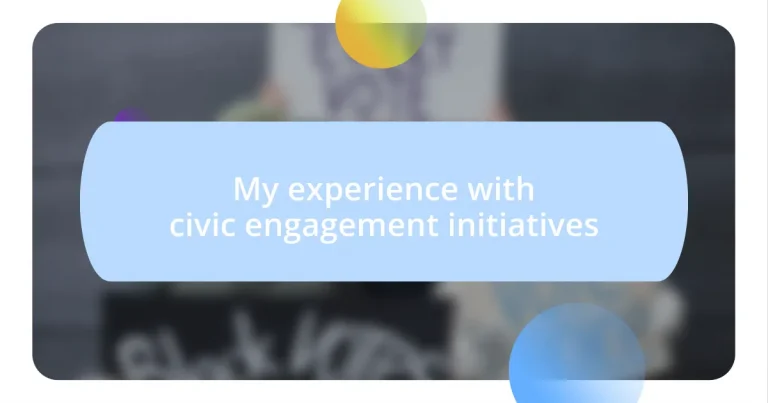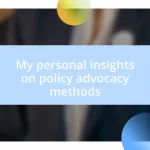Key takeaways:
- Civic engagement initiatives foster community connection and awareness of local issues through diverse activities like town hall meetings and volunteer projects.
- Participating in these initiatives enhances personal development skills, such as leadership, and contributes to meaningful community change.
- Challenges such as differing viewpoints, resource limitations, and time constraints can arise but can be overcome with persistence and creativity.
- Effective strategies for engagement include active listening, consistent participation, and leveraging social media to broaden outreach and involvement.
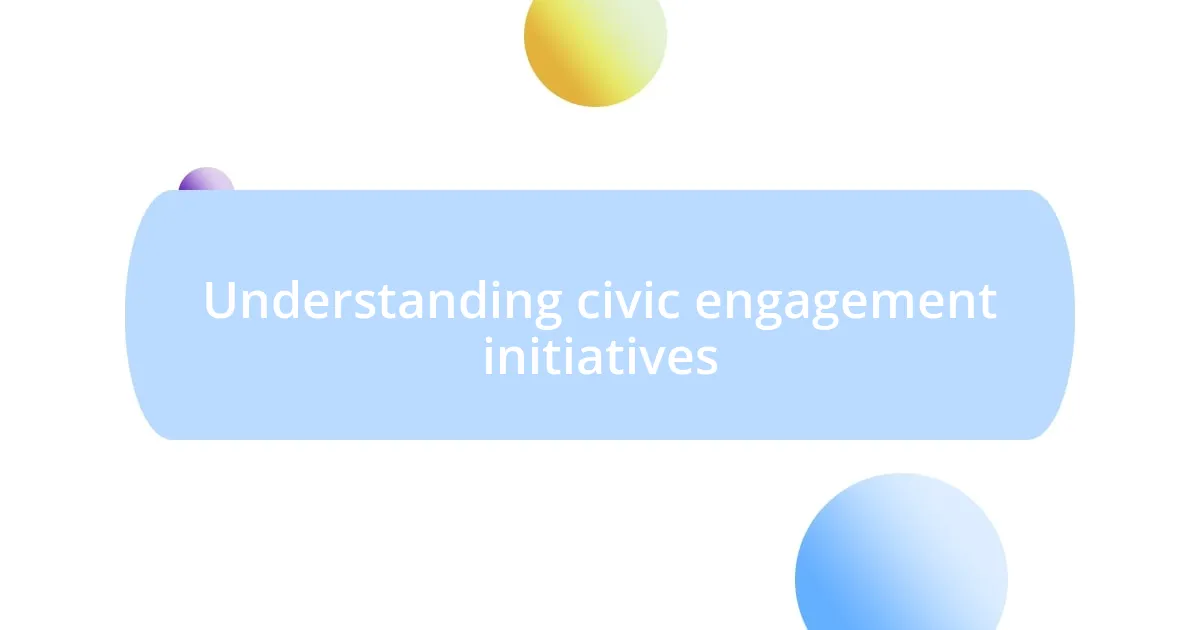
Understanding civic engagement initiatives
Civic engagement initiatives are crucial avenues for individuals to participate actively in their communities. I remember the first time I joined a local environmental cleanup event; it was eye-opening to see people from all walks of life come together for a common purpose. Have you ever felt that powerful sense of connection with others when working toward a shared goal?
These initiatives can take various forms, such as town hall meetings, volunteer projects, or advocacy campaigns. In my experience, participating in advocacy efforts, like raising awareness for mental health resources, ignited a passion in me that I hadn’t fully recognized before. It made me ponder—how often do we take the time to understand the issues that our neighbors are facing?
Additionally, civic engagement fosters a deeper understanding of civic responsibilities. When I served on our neighborhood association, I quickly learned that many residents had strong opinions about local policies but felt powerless to influence change. This experience highlighted the importance of empowering others—after all, what can be more fulfilling than seeing your community thrive through active participation?
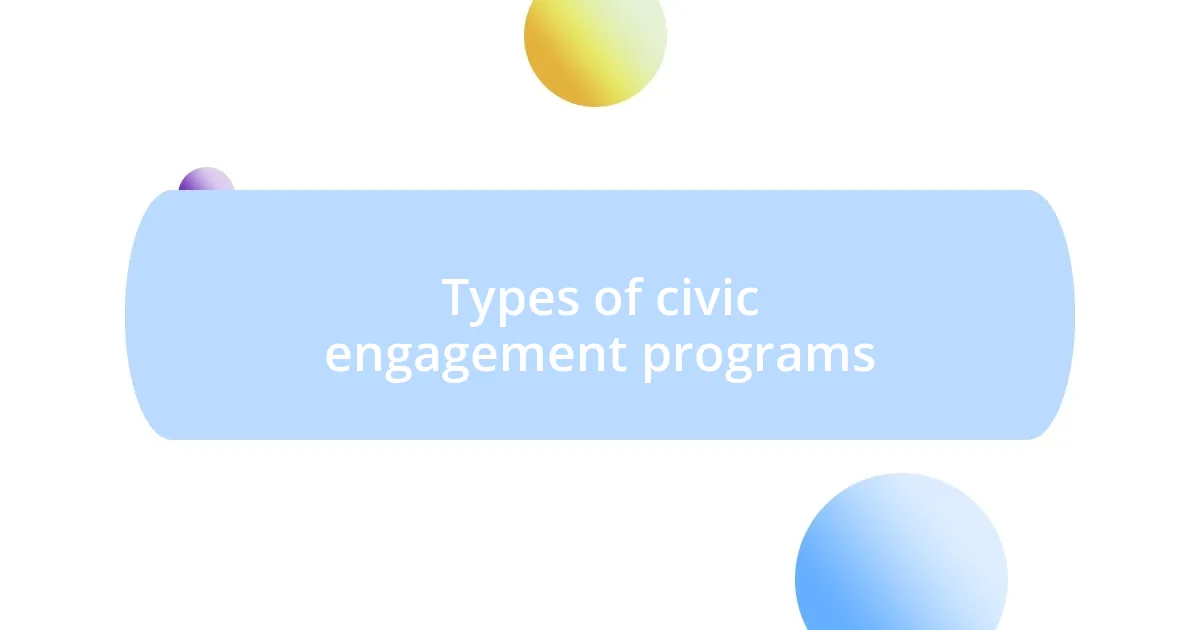
Types of civic engagement programs
Civic engagement programs come in various flavors, each offering unique ways to connect with your community. I once took part in a youth mentorship program that paired local high school students with professionals in different fields. It was incredible to witness the spark in these young minds as they explored new ideas and career paths. Sometimes, just that little nudge can inspire a lifetime of engagement.
Here are some common types of civic engagement programs:
- Community Service Projects: Activities that tackle specific local needs, such as food drives or park beautification.
- Advocacy Campaigns: Efforts aimed at promoting policy changes, like fighting for climate change initiatives or social justice reforms.
- Town Hall Meetings: Informal gatherings where community members discuss issues and voice their opinions directly to local leaders.
- Public Workshops and Forums: Educational events that aim to inform and engage residents on specific topics, ranging from health to financial literacy.
- Volunteer Opportunities: Arrangements that allow individuals to lend their time and skills to non-profit organizations or community groups.
Each of these initiatives offers a chance for meaningful connection. Reflecting on my experience with a local food pantry, I found that serving meals not only fulfilled a vital need but also created bonds with those I was helping. The laughter and stories shared over a simple meal unveiled the rich tapestry of community life, reminding me that civic engagement is as much about the relationships we build as it is about the tasks we undertake.
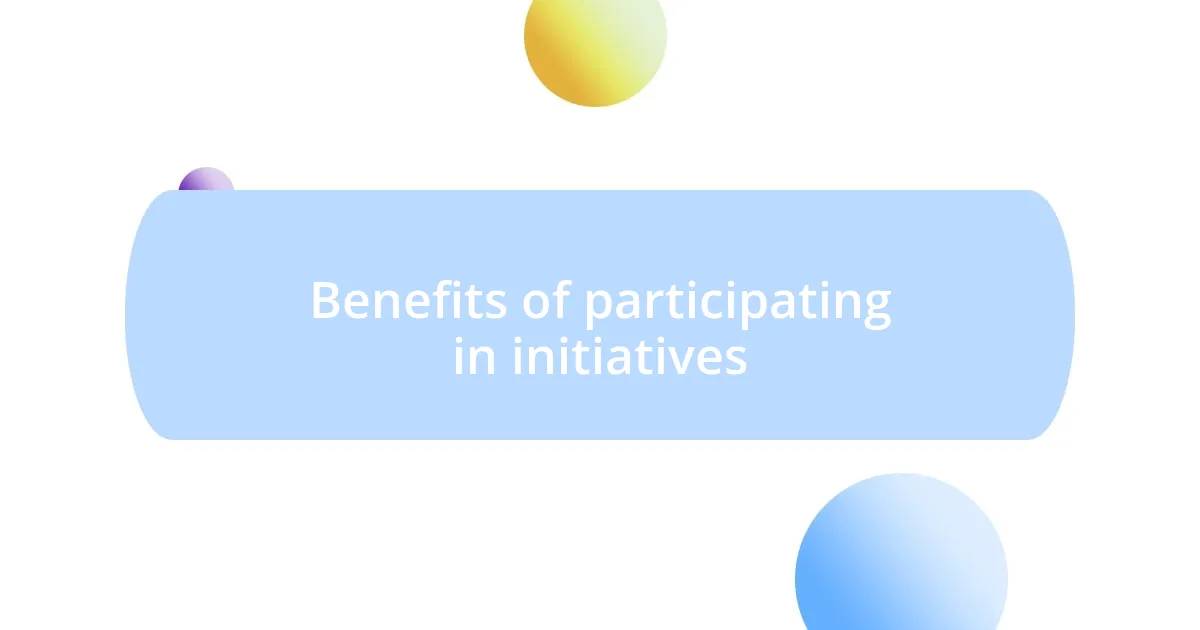
Benefits of participating in initiatives
Participating in civic engagement initiatives comes with numerous benefits that extend beyond just personal involvement. I vividly recall my volunteer experience during a community health fair. Not only did I gain valuable knowledge about local health resources, but I also found myself forming connections with people who share similar interests and concerns. This sense of community fosters an environment of support and understanding, making us feel less isolated in our efforts to advocate for change.
One significant benefit I observed is the enhancement of leadership skills. Through my participation in a local beautification project, I was tasked with organizing a group of volunteers. Initially daunting, this role pushed me to communicate effectively and motivate others. The confidence I gained from leading that team has been invaluable, and I now find myself more willing to take on leadership roles in various spheres of my life. Have you experienced something similar when stepping outside your comfort zone?
Moreover, being involved in civic initiatives allows you to contribute to meaningful change in your community. For instance, during a campaign advocating for improved public transportation, I witnessed firsthand how passionate advocacy can influence local decision-making. As we rallied together to present our findings to the city council, it was empowering to realize that our voices, when united, could drive real policy changes.
| Benefits | Personal Experience |
|---|---|
| Connection and Community Building | During a health fair, I bonded with fellow volunteers, creating lasting ties that enhanced my sense of belonging. |
| Development of Leadership Skills | Leading a beautification project taught me to manage a team and communicate effectively. |
| Impactful Change | Advocating for public transport improvements showed me how our collective efforts can sway local policy. |
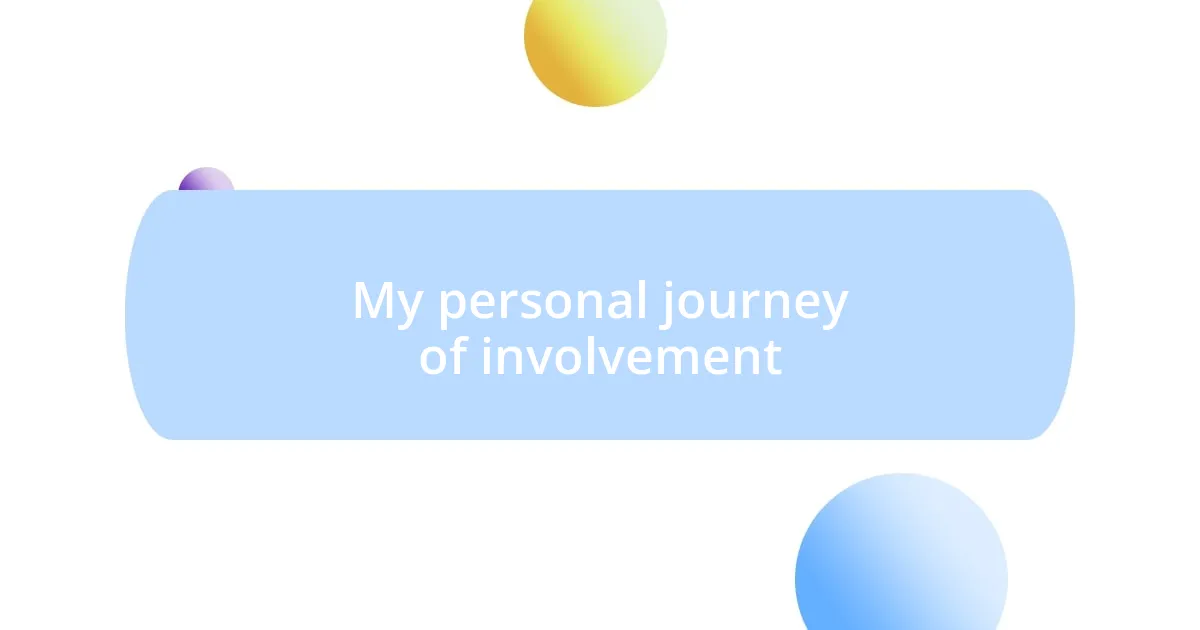
My personal journey of involvement
Reflecting on my personal journey of involvement, I remember attending my first town hall meeting, feeling a mix of excitement and apprehension. There’s something electrifying about being in a room filled with individuals who genuinely care about their community. I raised my hand to address a pressing local issue, and in that moment, I realized my voice mattered. Has anyone else felt that rush when sharing thoughts with local leaders?
As I continued to immerse myself in civic engagement, one memorable experience was organizing a neighborhood clean-up day. It might sound simple, but seeing friends and neighbors show up with brooms and bags in hand was a profound reminder of what can be accomplished when the community comes together. The shared laughter and unspoken camaraderie filled the air, creating an atmosphere that felt like old friends reuniting. It’s these little moments that create lasting memories and deepen our connections.
Involvement in these initiatives has also profoundly shaped my worldview. During a community forum on racial equality, I listened to powerful stories that stirred something deep within me. The varied perspectives reminded me of the often-overlooked struggles in our community. Each shared experience sparked a desire within me to continue advocating for change, connecting with others on a deeper level. Has engaging in discussions like this ever changed the way you see the world?
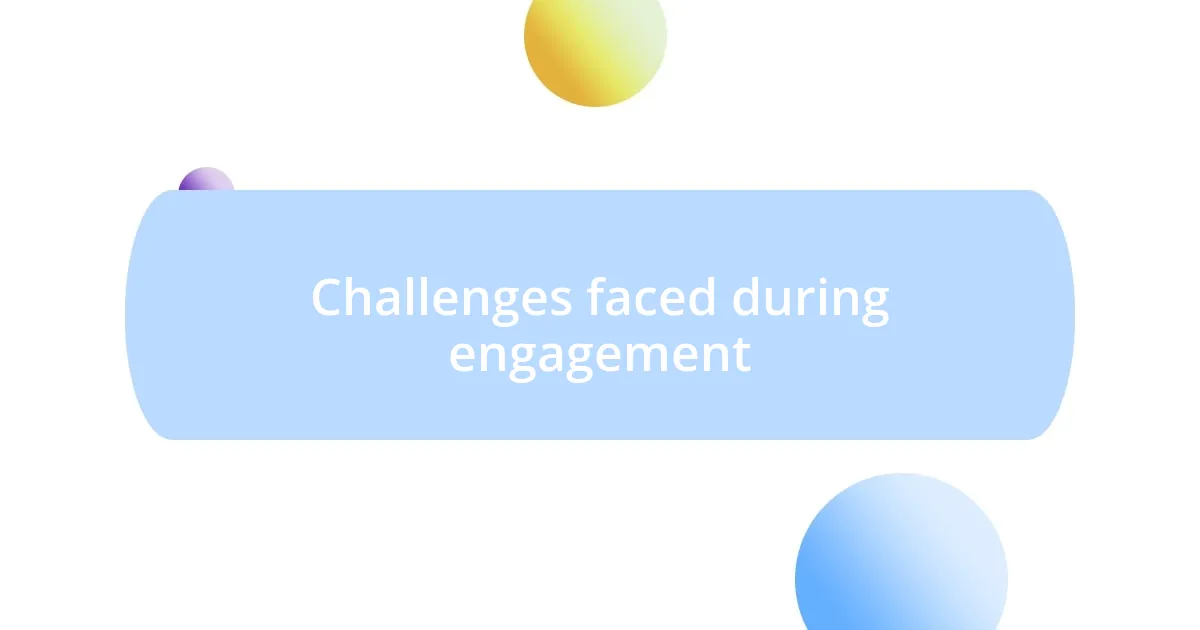
Challenges faced during engagement
Engaging in civic initiatives can be rewarding, but it often comes with its share of challenges. One obstacle I faced was navigating different viewpoints within the community. For example, during a development project, there were disagreements among residents about what improvements would be beneficial. It felt intense at times, like trying to herd cats! How can we all get on the same page when our opinions diverge so widely?
Another significant challenge I encountered was the limited availability of resources. While organizing an event to raise awareness about local environmental issues, I found that funding and volunteers were scarce. I remember feeling a bit overwhelmed—how do you rally support when you’re facing such constraints? It required creative thinking and persistence to find alternative ways to mobilize my community.
Time constraints also posed a difficulty during my involvement. Balancing my regular job and family responsibilities made it hard to commit fully to civic projects. I found myself asking, “Is it worth the juggling act?” Yet, I realized that even small contributions can create ripples of impact, motivating me to find pockets of time to dedicate to the cause. How do you prioritize your civic responsibilities when life gets busy?
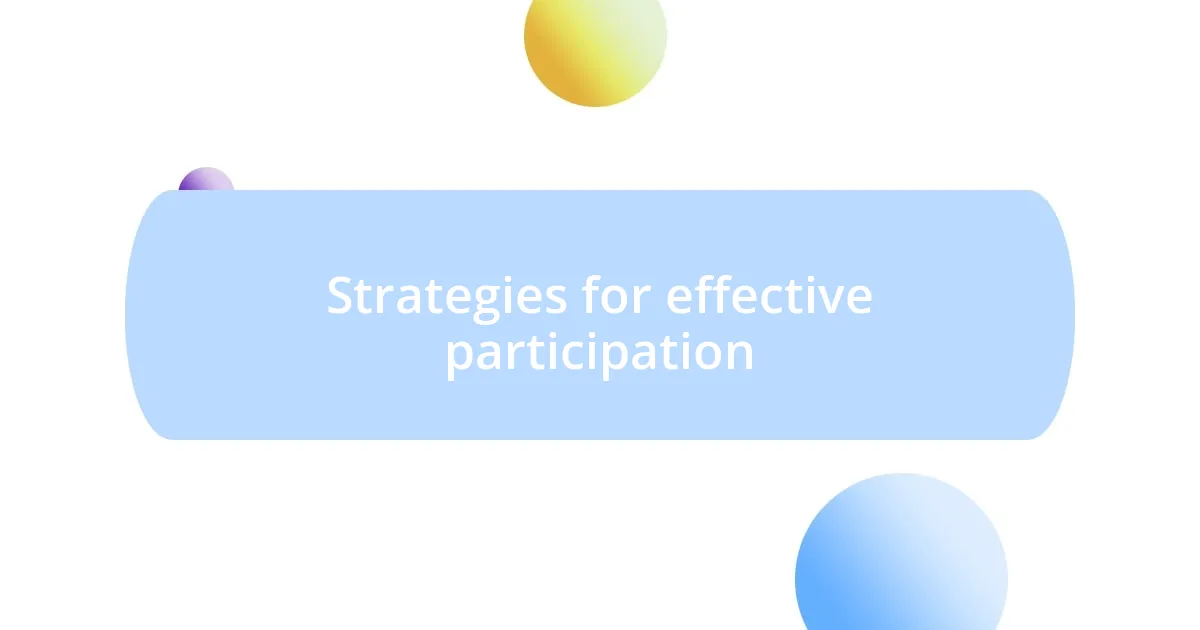
Strategies for effective participation
One effective strategy I found was to actively listen before jumping in. In a workshop I attended, I noticed that allowing others to voice their opinions first not only built trust but also created a more open atmosphere for dialogue. Have you ever tried this approach? It can be incredibly eye-opening, as you gain new perspectives that inform your contributions later on.
Moreover, consistency in participation is key. I remember showing up regularly at community planning meetings, not just for the sake of being present, but to foster relationships with fellow participants. These connections often turned into collaborative efforts, where we could rally together on shared issues. Do you think being a familiar face in your community can enhance the effectiveness of advocacy? I truly believe it can, as familiarity breeds understanding and collective action.
Lastly, leveraging social media proved to be a game-changer for me. I started sharing updates about our clean-up initiatives, highlighting the joy and progress made. The response was overwhelming; people who had once been passive supporters became vocal advocates. It made me wonder: how might our efforts evolve if we all utilized digital platforms to reach wider audiences? Engaging others online can amplify your message and inspire more individuals to join the cause.












